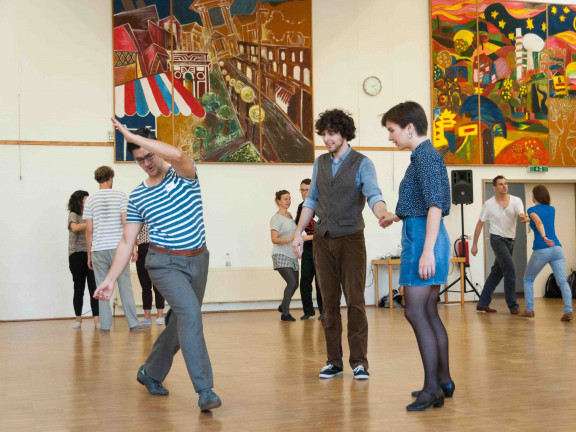What are the differences in strategy for teaching regular classes versus workshops?
Full Question:
What are the peculiarities of teaching regular classes versus single workshops? What strategic differences would you take when teaching weekly ongoing dance classes versus weekend workshops?
Video Answer:
Answer, in terms of Depth of Content:
At weekend dance workshops, structurally, the expectation is that you have this one intense moment with your students, and you can’t rely on getting more opportunities to work with these students. Therefore, we choose the topic and content so that it can be understood enough in that one session that students can continue working on it by themselves, and some might even be able integrate it into their dancing during the workshop. Especially if at the workshop we only get 1-2 hours with the students, we aim to maximise their learning capacity, and probably even push for some information overload, with the assumption that they’ll have time to digest things after the workshop. This way, they get a maximum value for the energy and money they spent to come to the workshop.
For ongoing weekly dance lessons, structurally, there is an expectation that you’ll get regular opportunities to contribute to your students’ learning. Therefore, sometimes we go for a deep dive and offer really intense and focused learning for parts of or a whole lesson, but sometimes we take a lighter approach with the same group; this way we create an emotional journey that has not only intensity but also relaxation, so that our students don’t burn out with information overload in the long run. In this context we tend to avoid information overload and rather leave space for things to sink in more during the lessons themselves.
Answer, in terms of Community and Group Impact:
Because there’s typically no expectation that people who missed a workshop should be able to keep up with those who did the workshop, we can focus and go deeply into a topic and help our students get as much out of that topic without having to consider the impact of this group of people being better at this topic than others in their community who didn’t take the workshop.
For local weekly classes however, an imbalance like this can be detrimental to the group experience. It’s very common for students who come to weekly lessons to miss a class here and there. And because we want to ensure that the group can still work well together, it’s better not to go too deeply into an essential topic in only a single lesson, but rather explore it over multiple sessions. This way, those who miss a lesson won’t be too far behind the rest of the group and have a chance to catch up. So instead of a single-topic deep dive, we tend to work on a few topics in parallel. This way, over time, we can achieve the same depth and have a greater chance to bring everybody along with us.
Answer, in terms of Representing the Dance:
At a workshop, we focus on presenting content that best represents who we are as dancers and what ideas we’ve been working on ourselves. At workshops, many students are there specifically because they’re interested in the thinking and concepts that brought us to where we are as dancers, and they’d prefer to learn about that rather than something more generic.
In our weekly classes, however, we feel freer to teach both content that are unique to us and our way of thinking about the dance as well as sometimes introducing other styles and concepts, to invite our students to explore outside the context of our perspective. We want to make sure students understand that we don’t represent the entire culture and art form of the dance; ours is just one perspective, and our students should frequently hear that they should look elsewhere too for their dance development.
Schedule a free 30-minute chat with Ali to geek out about teaching dance
Book a session with me to chat about dance teaching and explore any topics you want to discuss.
Note: This will not turn into a sales pitch! That, you can find here. Also, you won’t be added to any newsletter, you can sign up for that here.
We can discuss how to implement what you’re learning from this blog article, the challenges you face as a dance teacher or dance school owner, or any other topic about dance.
Of course, I hope that by getting to know me and my thinking better, you’ll trust that the full program will be of great value to you and that you’ll consider booking it. But I’ll leave that up to you.
I look forward to getting to know you. Book a session, and let’s meet!

Full Teacher Training Program
Kris and Ali have created an extensive Teacher Training Program for Dancers where you can delve deeper into how you can improve your dance teaching. You can learn all about it here: